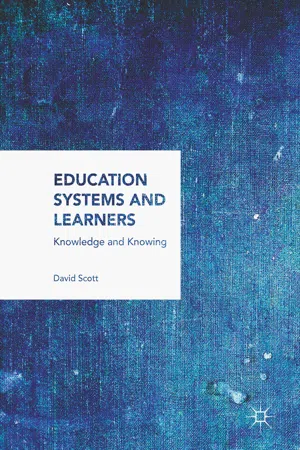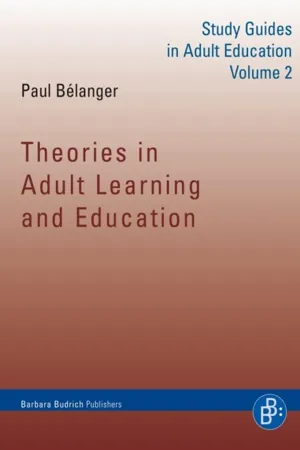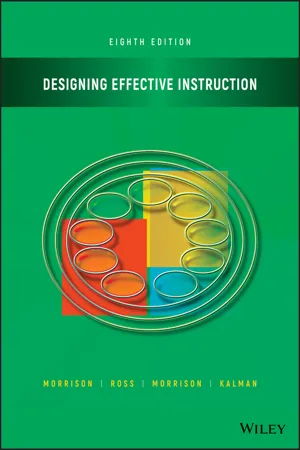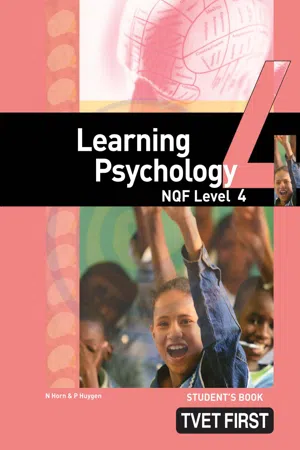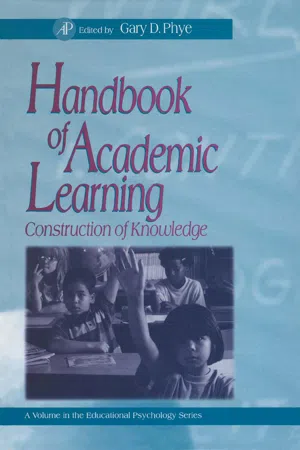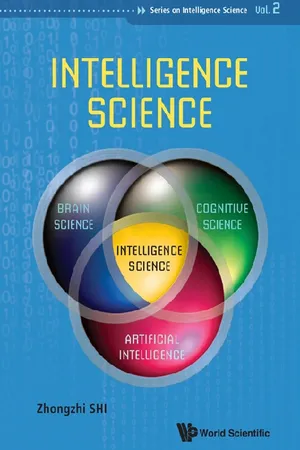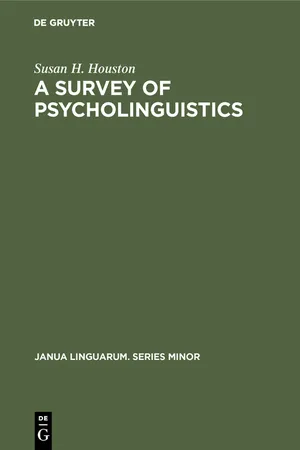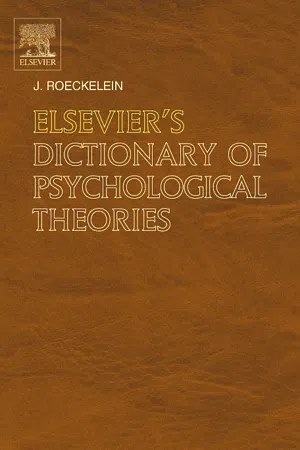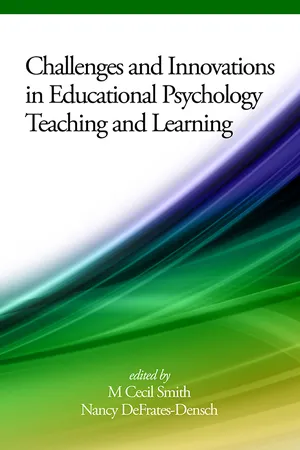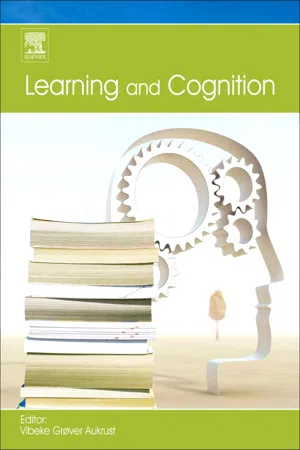Psychology
Learning Theory
Learning theory in psychology refers to the study of how individuals acquire new knowledge, behaviors, and skills. It encompasses various perspectives, such as behaviorism, cognitive psychology, and social learning theory, to understand the mechanisms and processes involved in learning. Key concepts include conditioning, reinforcement, observational learning, and information processing, which contribute to our understanding of how learning occurs in different contexts.
Written by Perlego with AI-assistance
Related key terms
1 of 5
12 Key excerpts on "Learning Theory"
- eBook - PDF
Education Systems and Learners
Knowledge and Knowing
- David Scott(Author)
- 2017(Publication Date)
- Palgrave Macmillan(Publisher)
Wenger (2008), for example, and particularly in relation to classifications of the concept, distinguishes between psychological and social theories of learning. In the first category he places behaviourist theories focusing on behaviour modification, cognitivist theories focusing on internal cognitive structures, constructivist theories focusing on building mental structures whilst interacting with an environment and social interaction theories that focus on interactive processes but understands them from a primarily psy- chological perspective. In the second category there are a series of social theories of learning. These include activity theories such as cultural-historical activity frameworks, socialisation theories such as community of learning theories (cf. Wenger 1998) and organisational theories that concern them- selves both with the ways individuals learn in organisational contexts and with the ways in which organisations can be said to learn as organisations. A theory of learning pivots on the idea that there is an entity called for the sake of convenience a human and this entity has a relationship (both inward and outward) with an environment (for some, this entails a post-humanising and materialising process, cf. Edwards 2015). A further complication is that any description of this process and set of relations entails another and different set of actions and relations. In mapping or characterising the field, here there is a concern with epistemic differences between the range of theories presented, though these differences also focus on the probative force and attached value given to these relations and entities. 56 EDUCATION SYSTEMS AND LEARNERS A THEORY OF LEARNING A curriculum in essence is a planned programme of learning, and therefore if we are to understand it, we also have to develop a theory of learning. - No longer available |Learn more
- Paul Bélanger(Author)
- 2011(Publication Date)
- Verlag Barbara Budrich(Publisher)
Part One: Adult Learning Theories 2. Introduction to Adult Learning Theories What does it mean to learn? What goes on in our minds when we acquire or mobilise new knowledge and skills? How do different environments influ-ence learning aspirations and learning processes? What is the significance of past experiences and of informal learning? How do we interpret learning mis-takes and their impact? How do we apprehend the various roles of teachers, trainers, facilitators, or mentors? More generally, what are the main driving forces in the learning life course and the various possible sequences in learn-ing biographies? Diverse interpretations and responses have been given to these questions. Various learning theories have proposed specific concepts to grasp the com-plex reality of human learning. Among these learning theories attempting to capture and systematise the learning process and its specificities, three major orientations have emerged and continue to evolve: *behaviourist theory (Skinner, Thorndyke, Watson), *cognitivist (Brunner, Gagné) and socio-cognitivist theories (Bandura), and *constructivist (Dewey, Piaget, Vygotsky) and socio-constructivist (Lave and Wenger) theories. Reviewing the literature on the learning process, one could of course find a much broader variety of theoretical frameworks. For this introductory section, however, we decided to focus on these three founding theoretical approaches and their subsequent development. Inspired by these analyses or their critical assessment, other learning theories have been developed that are closer to the specific contexts of adult learning. We will go on by exploring three of these approaches: *humanist Learning Theory (Rogers), *experiential Learning Theory (Kolb and Schön, fur-ther developed in the adult learning field by Jarvis and Illeris), and *transfor-mative theory (Mezirow). - eBook - PDF
- Gary R. Morrison, Steven J. Ross, Jennifer R. Morrison, Howard K. Kalman(Authors)
- 2019(Publication Date)
- Wiley(Publisher)
Most design- ers, including your textbook authors, find combinations of the multiple theories described in the following pages valuable for design planning. Learning Theory A Learning Theory is a set of laws and principles that broadly explain learning and behavior. Using theory, the prediction, observation, and interpretation of events become much more orderly rather than intuitive or subjective. A Learning Theory tends to be descriptive. It creates a “big picture” of what is likely to happen and why. For example, behavioral Learning Theory, as one might associate with B. F. Skinner’s work (Skinner, 1954), emphasizes the effects of external conditions such as rewards and punishments in determining future behavior. In contrast, cognitive theory, as represented by the work of Jean Piaget (1952) and Jerome Bruner (1963, 1973), focuses on how individuals perceive, process, store, and retrieve information that they receive from the environment. A social-cognitive theory, such as that of Vygotsky (1962), might stress how students learn from others in cooperative settings. As indicated earlier, most instructional designers draw from multiple theoretical paradigms, using the ideas and scientific principles that apply best to the design task at hand. Despite their importance as explanatory frameworks, learning theories don’t tell the designer what to do specifically to achieve the goals of the particular task. For example, a designer hired to develop an advanced training unit on corporate tax law may consider, on the basis of Learning Theory, using small steps and frequent overt feedback (i.e., behavioral theory), including numerous examples and nonexamples to strengthen conceptual learn- ing (i.e., cognitive theory), and practicing in small teams of students (i.e., social Learning Theory). - eBook - PDF
Learning Psychology NQF4 SB
TVET FIRST
- N Horn P Huygen(Author)
- 2013(Publication Date)
- Macmillan(Publisher)
1 Overview This topic looks at the different theories about how we learn. Module 1 covers the Social Learning Theory that states that people learn new behaviour through observing the social factors in their environment and learning through these observations. Module 2 covers the Behaviourist Theory of Learning that claims that learning is a matter of conditioned reflexes, and that environmental factors and society condition us to model our behaviour according to a certain set of norms. In Module 3, we look at the Cognitive Theory of Learning which looks at the development of a person ’ s thought processes and how we understand things and interact with the world. Module 4 covers the Socio-cultural Theory of Learning. According to this theory, learning starts with experience and experience is always social, even in a formal classroom environment. In Module 5, we look at the Multiple Intelligences Theory of Learning, which argues that the traditional definition of intelligence is not enough to explain the many abilities human beings have. In Module 6, we look at the Maturation Theory of Development. This theory describes that a child passes through certain stages of development before reaching maturity and that teaching materials and methods can be adapted according to the level of maturity of the child. Topic 1 Theories of learning 2 Topic 1: Module 1 The Theory of Social Learning Overview After completing Module 1, you should be able to: • define social learning and identify the theorist/s • make a presentation of the Theory of Social Learning • provide examples of how the Theory of Social Learning can be applied in practice • describe your own reaction to the Social Learning Theory. 1 .1 Social influence on individual behaviour As humans, we are primarily social in nature – we constantly interact with our environment and the people that surround us. - eBook - PDF
Handbook of Academic Learning
Construction of Knowledge
- Gary D. Phye(Author)
- 1997(Publication Date)
- Academic Press(Publisher)
Handbookof AcademicLearning Copyright 91997 by Academic Press, Inc. All rights of reproduction in any form reserved. 47 48 Gary Phye At the psychological level of analysis, emphasis is placed on the construc- tion of personal knowledge (how a person acquires knowledge). This level of analysis is commonly referred to as constructivism and has a long tradition in educational circles. In addition to Dewey, Piaget, and Vygotsky are also major figures identified with constructivism. A major defining characteristic of con- structivism is the emphasis on a child-centered approach to educational practice (pedagogy). This is the basic focus taken in this chapter. The empha~ sis on classroom learning and remembering simply reflects a psychological level of analysis. Obviously, philosophy influences educational policy. How- ever, the position taken throughout this chapter is that educational practice from a psychological level of analysis is a worthy endeavor. Why bother with a chapter on learning and remembering? Basically, be- cause the personal knowledge construction that is the basis for classroom learn- ing and achievement is the result or outcome of these two processes (learn- ing and remembering). For cognitive and educational psychologists, all learning involves memory. All knowledge involves memory. When we say that we know something, we imply that we have experienced it or thought about it before and that we remember our experience (Schwartz & Reisberg, 1991, p. 237). This is a reminder that, while memory may have a bad name in some educational circles, classroom learning involves acquisition, storage, and retrieval. Acquisition is the study of how new information is acquired. A basic question might be, What is the maximally efficient way to learn? However, when something is learned, we must hold that information until it is needed at a later time. - eBook - PDF
- Zhongzhi Shi(Author)
- 2012(Publication Date)
- World Scientific(Publisher)
This theory emphasizes that learning is of societal properties and pays attention to the influence of interactions between teacher and student and among students for learning. By this theory, learning is divided into elementary and advanced learning with emphasizing student’s constructing network knowledge structure through advanced learning. A set of novel and creationary opinions are put forward in teaching goal, teacher’s function and teaching method and design etc. These opinions have some positive significance in relation to further realizing learning’s essence, revealing learning’s law and deepening teaching reform. The theory of constructivism flourished on the basis of absorbing all kinds of learning theories. However, there are some contradictions in this theory, which betrays its shortcomings, so it needs to further develop and improve. 9.4 Humanistic Learning Theory Humanistic psychology is a psychological thought rose in fifties or sixties of the 20th century in the United States. Its main representatives are A. Maslow and C. R. Rogers. Humanistic view of learning and teaching profoundly affected the world-wide education reform, with the programmed instruction movement, the subject structure of movement par the 20th century, one of the three major education campaign. Humanistic psychologist thought that to understand human behavior, one must understand the sense world of behavior person. When understanding human behavior, an important one is not the external fact, but a meaning of the behavior. If we want to change a person’s behavior, we should change his faith and perception at first. When ways that he looks at problem are different, his behaviors are just different. In other words, the humanism psychologist attempts to explain and understand the behavior from behavior person himself instead of observer. Below we will introduce Rogers’s Learning Theory, who is a representative of humanism Learning Theory. - eBook - PDF
- Susan H. Houston(Author)
- 2019(Publication Date)
- De Gruyter Mouton(Publisher)
28 COGNITIVE Learning Theory example, cognitivism is well suited to the study of perception and concept formation, topics for which stimulus-response explana-tions are either weak or lacking. Cognitive theory, and Gestalt theory in particular, has produced what seems to be a valid and useful set of principles describing the development of perceptions, the role of insight in learning, and especially the nature of our intrinsic structuring of the environment. It may be readily seen that this is a different order of phenomenon than that treated by most S-R oriented work, and thus one need not regard the 'choice' of a school of psychology as an all-or-none proposition - both S-R and cognitive notions are blended in any realistic de-scription of the learning process. The relevance of cognitive theory to modern psycholinguistics may not be immediately apparent from the above indication of typical cognitive concerns. But, although cognitive theory has not played an active part in the discipline of psychology for some years, it is in one sense at least very much akin to current psycho-linguistic thought. We have indicated that in general the S-R theorists are concerned with learning and the cognitivists with perception. The ability to learn, or to form stimulus-response as-sociations, may properly be regarded as universal to all creatures with a nervous system (as well, apparently, as to some dubious cases such as the earthworm). The only significant endogenous 1 component of this kind of learning is precisely the ability to as-sociate a response with a stimulus. Very little, then, need be postulated as innate in such a system, nor is there any pressing need to assume different neural equipment for homo sapiens than for other relevant species. - Katherine Fogelberg(Author)
- 2023(Publication Date)
- Wiley-Blackwell(Publisher)
Given that there was further evolution of this theory as applied to education, why do we continue to use it? As with many things that have become embedded in society, behav- iorism was the bedrock upon which many educational practices were built. It is difficult to eradicate approaches that seem to work, even when we have ample evidence to support that it does not work the way we would like it to all the time. Such is the case with behaviorism; in spite of well over 70 years of research demonstrating that behaviorism does not adequately induce learning, it continues to have strong influence in our educational institutions, because, according to Wortham (2003), it works – at least well enough to provide educators and students a reasonable amount of evidence that reinforcements can shape behav- ior. However, the lack of attention paid to the mental (cog- nitive) processes that also contribute to behavior is where this theory as applied to education falls short. Fortunately, recognition that people could learn in the absence of exter- nal reinforcements allowed the theory to evolve into one that did focus on mental processes. Part 3: Cognitivism: Recognition that Mental Processes Matter Rooted, once again, in psychology, cognitivism as a learn- ing theory emerged as a reaction to behaviorism within the borders of the classroom and within its original discipline. Cognitivism rejects the idea that learning is simply a stimu- lus–response process, and although the cognitivist move- ment started just shy of a decade after behaviorism took off, it was alongside the rise of social behaviorism, which believed mental processes were where true learning was happening with behaviors merely being the manifestations of that learning, that this school of thought began to take hold. Edward Chase Tolman [1886–1959] is considered the pioneer who started cognitivism within psychology (Yilmaz 2011; Bruner 2004).- J.E. Roeckelein(Author)
- 2006(Publication Date)
- Elsevier Science(Publisher)
Currently, the work by intervening variable theorists on classical conditioning and by experimental analysts on operant con-ditioning may be viewed as converging on a common understanding of mutually employed concepts such as the key concept of rein-forcement in Learning Theory . However, vari-ous important questions concerning learning processes and phenomena remain unanswered (Hergenhah, 1982): How does learning vary as a function of maturation ? Does learning depend on reward ? How does learning vary as a function of species ? How does learned be-havior relate to instinctive behavior? Can some associations be learned more easily than others? How does learning vary as a function of personality characteristics? To what extent is learning a function of the total environ-ment ? and How do internal and external vari-ables interact with type of learning? (cf., the areas of applied Learning Theory in educational psychology called instructional theory and instructional design; Gagne, 1985; Reigeluth, 1983; cf., knowledge of results principle - states that immediate/prompt feedback given to a learner concerning performance is more effective than delayed feedback, also called performance re-view effect ; practice effect - refers to any change or improvement in learn-ing that results from repetition or practice of the task materials; and testing effect - refers to any of a number of consequences of taking tests, ranging from developing a strong atti-tude, positive or negative, towards tests to learning how to take tests to obtain unwar-ranted positive results). Most of what is now known about learning came out of the great debates among learning theorists that took place in the 1930s and 1940s. Such an atmos-phere still exists in psychology, but the debate among learning theorists does not seem to be as intense today as it was during that earlier era. See also ASSOCIATION, LAWS/PRINCIPLES OF; BANDURA’S THEORY; BEHAVIORIST THEORY;- eBook - PDF
- Frederick C. Gruber(Author)
- 2017(Publication Date)
Children are going to learn most of their likes and dislikes, their absorbing interests or lack of them, their ambitions or lack of them, their ideals or the lack of them. How much this is left to accident, how much and by whom it is to be planned is a choice which parents and teachers individually and collectively must make. VII And now, having emphasized that a feeling of adult re- sponsibility for the direction of education is psychologi- cally defensible, I close with a brief summary. A survey was made of progress during the last thirty years toward supplying an adequate psychological foundation for the direction of learning. It was noted that to a gratifying de- gree wordy argument has given way to experimental ac- A PSYCHOLOGICAL BASIS FOR LEARNING 5 3 tivity and rapid revision of theory. The opinion was ex- pressed that there is a considerable degree of agreement among those most active in the formalization of Learning Theory. Concern was expressed however over the extent to which Learning Theory has continued to be based upon a concept of learning as being typically the gradual strength- ening of habits. The question was raised whether Learning Theory so conceived is not basically ill-conceived and hence fundamentally ill-designed to provide the psychological foundation needed for the direction of education. The opinion was expressed that for the same reason current theory does not even adequately contribute to the im- provement of the efficiency of teaching in those situations in which practice seems to be most needed. In the face of this inadequacy, it was pointed out that those educational psychologists are to be commended who try to provide a more educationally useful psychology of learning, who choose to teach a speculative theory which may prove to be valid in preference to teaching a too limited theory be- cause it is highly formalized. - M Cecil Smith, Nancy DeFrates-Densch(Authors)
- 2012(Publication Date)
- Information Age Publishing(Publisher)
SECTION I TEACHING LEARNING THEORIES FOR EDUCATORS Challenges and Innovations in Educational Psychology Teaching and Learning, pages 3–13 Copyright © 2016 by Information Age Publishing All rights of reproduction in any form reserved. 3 CHAPTER 1 TEACHING ACROSS RATHER THAN WITHIN THEORIES OF LEARNING A “Big Ideas” Approach to Organizing Educational Psychology Courses Jeanne Ellis Ormrod University of Northern Colorado As members of an exponentially expanding discipline, we educational psy- chologists have published thousands of articles and presented countless papers about effective instructional strategies for teaching various topics in our field. Well-crafted lectures, small-group cooperative and collaborative activities, case studies, problem-based discussions, independent readings— all of these strategies and many others can enhance our students’ ability to understand and apply principles and theories of learning, development, motivation, instruction, and related topics. In this chapter I try to move the conversation in a different direction to address the question, “How can we best organize what we teach in educational psychology courses?” To be consistent with the subtitle of this volume’s subsection—Teaching Learning 4 J. E. ORMROD Theories—my focus here will be on how we might organize the things we have collectively discovered about human learning. Traditionally, many of us have organized our instruction about human learning into discrete theory-specific units—units that each focus on a par- ticular “ism.” For example, we might create separate units on, say, behavior- ism, social cognitive theory, information processing theory, constructivism, and sociocultural theory. Most textbooks, too, take a theory-by-theory ap- proach, reflecting a legacy that goes back to the middle of the twentieth cen- tury (e.g., see Hilgard & Bower’s classic Theories of Learning, 1966). There are probably two overlapping reasons for such an organizational scheme.- eBook - PDF
- Vibeke Grøver Aukrust(Author)
- 2011(Publication Date)
- Elsevier(Publisher)
Situative – A perspective on cognition, learning, and education that analyzes processes of interaction, in which individuals participate, along with other material and informational systems. Many practices of conventional schooling consider knowl-edge and skill as discrete structures of cognition that can be adequately transferred from teachers to students in class-rooms and studied in laboratories. Knowing and thinking, in this view, are assumed to go on in individual minds isolated from the complexity of the world outside, from which abstract knowledge can be successfully distilled. However, a growing body of research that considers cogni-tion and learning in activities outside of specialized learn-ing environments is undermining the plausibility of these presuppositions (e.g., Brown et al., 1989; Engestro ¨m, 2001; Greeno et al., 1996; Hutchins, 1995a; Lave and Wenger, 1991; Nersessian et al ., 2003; Rogoff, 1990; Rogoff and Lave, 1984). This research supports the view that knowing and learning by individuals are inextricably situated in the physical and social contexts of their acquisition and use. It is a mistake to think that classrooms or laboratory experi-ments produce knowledge or follow principles of learning that are somehow context free. Cognition and learning by individuals always occur in a context; the issue has to be what the context is, not whether there is one. For most of the last half-century, active research pro-grams have been studying structures and processes of social interaction, as well as cognitive processes of repre-senting and transforming information. However, these research programs have been largely separate from each other. Situative research and theorizing attempts to unify the two perspectives of individual cognitive theory and the analysis of interactional structures and processes.
Index pages curate the most relevant extracts from our library of academic textbooks. They’ve been created using an in-house natural language model (NLM), each adding context and meaning to key research topics.
